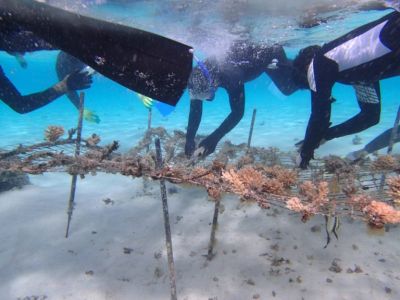 The Nairobi Convention serves as a platform addressing coastal and marine ecosystems in the Western Indian Ocean (WIO). Through collaborative efforts, parties like Kenya, Mauritius, and Seychelles join forces for national and regional actions. Additionally, actions are implemented to combat environmental stresses and promote sustainable ecosystems. Consequently, the Nairobi Convention focuses on socioeconomic and environmental benefits. Protecting marine ecosystems is essential for maintaining biodiversity and mitigating climate change
The Nairobi Convention serves as a platform addressing coastal and marine ecosystems in the Western Indian Ocean (WIO). Through collaborative efforts, parties like Kenya, Mauritius, and Seychelles join forces for national and regional actions. Additionally, actions are implemented to combat environmental stresses and promote sustainable ecosystems. Consequently, the Nairobi Convention focuses on socioeconomic and environmental benefits. Protecting marine ecosystems is essential for maintaining biodiversity and mitigating climate change
A key focus of the GEF-funded WIOSAP project is reducing land-based pollution. In collaboration with national and regional partners, Mauritius aims to protect marine ecosystems. Furthermore, blue carbon ecosystems like seagrass and mangrove forests store carbon, aiding in climate change mitigation. Thus, Mauritius actively engages in reforestation and the establishment of marine protected areas.
Mauritius launched a two-year project under WIOSAP to assess blue carbon ecosystems. It aims to determine seagrass carbon storage and contribute to climate change mitigation. Moreover, seagrass meadows store significant amounts of organic carbon, supporting global environmental goals. At the same time, human activities like coastal development harm seagrass, contributing to biodiversity loss.
The project addresses these challenges by mapping seagrass and determining carbon storage potential. By involving surveys and establishing monitoring stations, data on seagrass density was gathered. Ultimately, this supports Mauritius’ national marine spatial planning (MSP) process. Additionally, a public sensitization campaign aims to raise awareness on seagrass conservation. Efforts aimed at protecting marine ecosystems help ensure the long-term health of our oceans and coastal communities.
Looking forward, Mauritius plans to establish a national blue carbon task force. This group will focus on capacity building and implementation of nature-based solutions. Ultimately, Mauritius is committed to preserving blue carbon ecosystems for sustainable development.
source:https://www.nairobiconvention.org/strengthening-marine-ecosystems-the-case-of-mauritius/


